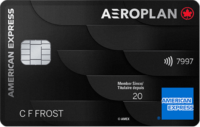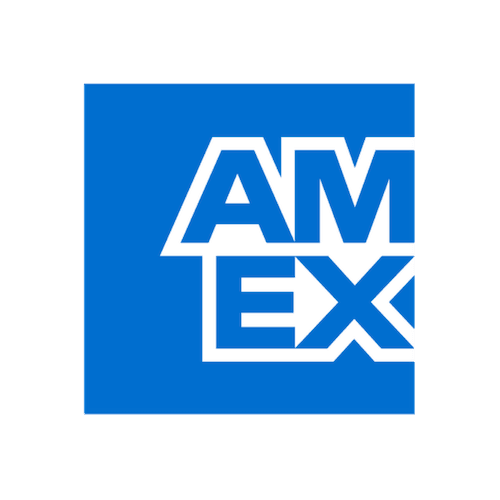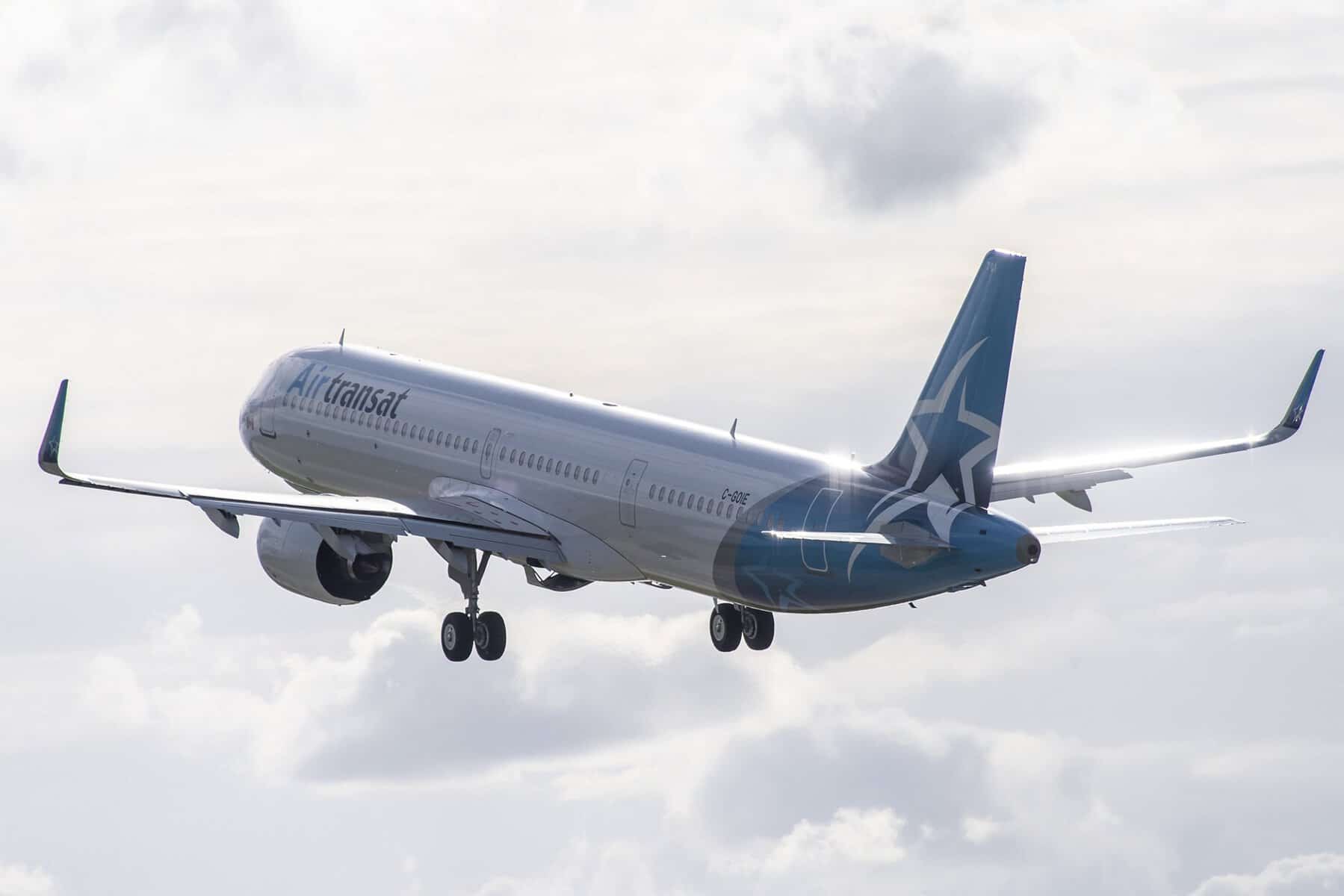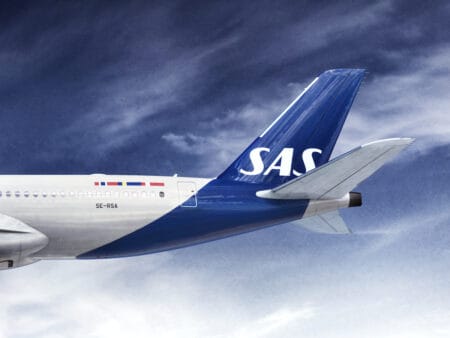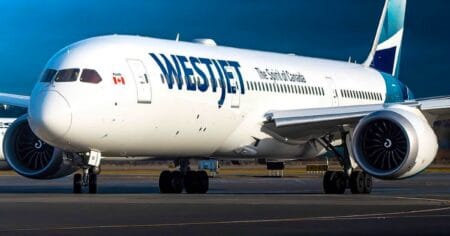After Air Canada, now it’s Transat’s turn!
The Federal Government and Air Transat have reached an agreement for $700 million in assistance, including a fund dedicated to the reimbursement of unused airfare following the COVID-19 pandemic.
Talks have been going on for several months, and the Government of Canada has consistently made the reimbursement of cancelled flights a condition of possible federal assistance.
Subscribe to our free newsletter to make sure you don’t miss anything!
Flight refunds
As part of this agreement, $310 million consists of an unsecured credit facility to provide refunds to travellers scheduled to depart on or after February 1 2020 and for which a travel credit has been issued due to COVID-19.
It is now possible to request a refund on the Air Transat website.
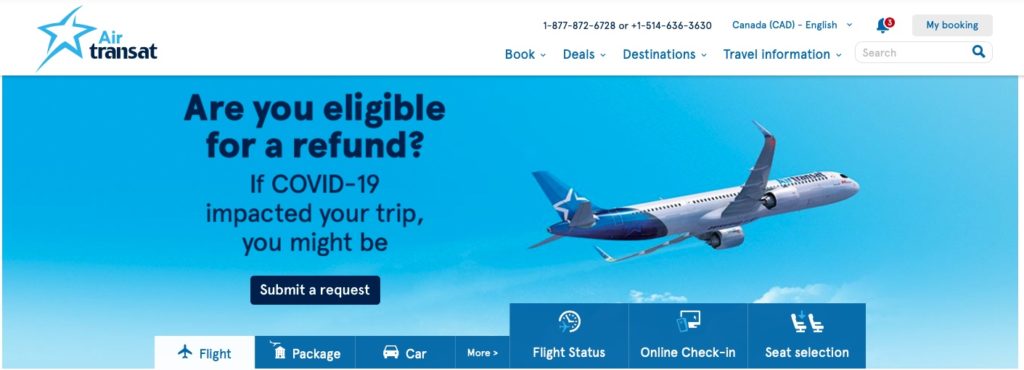
See our detailed article on the refund process with Air Transat and frequently asked questions.
The details of this aid
The new fully repayable credit facilities made available by the Canada Enterprise Emergency Funding Corporation under the Large Employer Emergency Financing Facility, which Transat would use only as-needed basis, are as follows:
- An amount of $390 million representing the liquidity required to support Transat until its business has recovered to a level where it can generate cash again, and which is allocated as follows:
- An amount of $78 million in the form of a non-revolving and secured credit facility bearing interest at CDOR (Canadian Dollar Offered Rate) plus 4.5% and maturing in 2 years; the facility is secured by a first-ranking charge on the assets of Transat A.T. Inc.
- An amount of $312 million non-revolving, unsecured credit facility with a 5-year maturity, loaned at a rate of 5% in the first year, increasing to 8% in the second year, and 2% per annum thereafter, with the option to capitalize interest in the first two years.
- In the context of the financing arrangement, Transat issued a total of 13,000,000 warrants to purchase an equivalent number of shares of Transat (subject to certain limitations described below), with customary adjustment provisions, at an exercise price of $4.50 per share (representing the volume-weighted average trading price for the five trading days preceding the issuance of the warrants) over a 10-year period, representing 18.75% of the total commitment available under the above unsecured non-revolving credit facility The warrants are to vest in proportion to the drawings that will be made, 50% of which would be cancelled if the loan were to be repaid in full in the first year.
- An amount of $310 million consisting of an unsecured credit facility to provide reimbursement to travelers scheduled to depart on or after February 1, 2020, for whom a travel credit was issued as a result of COVID-19. This amount is repayable over a 7-year term and is loaned at the current 7-year Canada Bond rate of 1.2%.
The number of shares issuable upon exercise of the warrants may not exceed 25% of the currently issued and outstanding shares, nor may it result in the holder holding, following the exercise of the warrants, 20% or more of the outstanding shares. In the event of an exercise exceeding these thresholds, the excess will be payable in cash based on the difference between the market price of Transat shares and the exercise price. Finally, in the event of full repayment of the credit facility by its maturity, Transat will have the right to redeem all of the warrants for a consideration equal to their fair market value. The warrants will not be transferable prior to the expiry of the period giving rise to the exercise of this redemption right. In addition, the holder of the warrants will also benefit from registration fees to facilitate the sale of the underlying shares and the warrants themselves (once the transfer restriction is lifted).
In connection with the establishment of these credit facilities, Transat has made certain commitments, including:
- The reimbursement of travelers who were scheduled to depart on or after February 1, 2020, to whom a travel credit has been issued due to COVID-19. Refunds will begin immediately, under terms to be communicated separately. In accordance with the agreement reached, in order to be eligible, customers will have to indicate their wish to be reimbursed;
- Restrictions on dividends, stock repurchases and executive compensation;
- Maintaining the level of active employment at the level observed on 28 April, 2021.
In addition to the new financing, the amounts already drawn on the existing facilities will remain in place. They will be extended for a period of two years from the implementation of the new financing. The ratios applicable to the existing facilities will be suspended for a period of 18 months. The undrawn credit under the short-term subordinated facility will be cancelled.
In total, the available funding will therefore amount to a maximum of $820 million. This includes the newly issued LEEFF funding, as well as existing funding of $120 million divided into $50 million under the secured revolving credit facility with National Bank of Canada and the Bank of Nova Scotia and $70 million under the subordinated credit facility with National Bank of Canada and Export Development Canada.
If all of the available facilities were to be used, it would be at an average rate of approximately 6%, plus the warrants.
